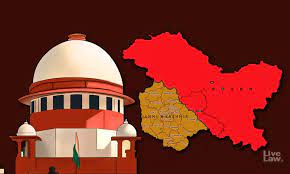NEW DELHI: Asserting that Parliament had the power to convert an existing state into a Union Territory, the Supreme Court has said that such law can’t be considered as an amendment to the Constitution. “By the same law, a provision can be made as to the representation in Parliament and in the legislature of the Union Territory created by such law,” said a Bench led by Justice Sanjay Kishan Kaul – which on Monday dismissed a petition challenging notifications for delimitation of Assembly constituencies in J&K for being bereft of any merit.
On August 5, 2019, the special status of J&K under Article 370 was done away with and on October 31, 2019, Parliament enacted the J&K Reorganisation Act which provided for reorganisation of J&K by dividing it into two UTs — J&K and Ladakh.
Explaining the constitutional scheme, the Bench said, “Article 3 provides that Parliament may by law form new states and alter the areas, boundaries or names of the existing states. The explanation I provides that in clauses (a) to (e) of Article 3, a state includes Union Territory.
“Thus, Explanation I makes it amply clear that the power of Parliament under Clause (a) of Article 3, to make a law to form a new state or to alter a boundary of a state includes the power to make a law to form a new UT. Explanation II clarifies that the power conferred by clause (a) on Parliament to enact the law to form a new state includes a power to form a UT by uniting parts of any state or UT to any other state or UT.”


